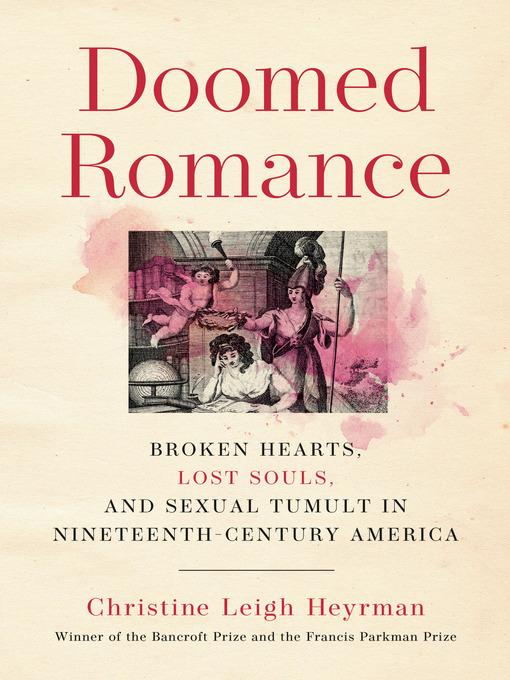
Doomed Romance
Broken Hearts, Lost Souls, and Sexual Tumult in Nineteenth-Century America
کتاب های مرتبط
- اطلاعات
- نقد و بررسی
- دیدگاه کاربران
نقد و بررسی

December 21, 2020
Bancroft Prize winner Heyrman (American Apostles) delivers an immersive look at changing gender dynamics within evangelical Protestantism in the years before the Civil War. Heyrman centers the narrative on Martha Parker, a New England schoolteacher who aspired to be a missionary. Women in the 1820s could only enter the missionary field as ministers’ wives, however, so Martha’s engagement to Elnathan Gridley, a clergyman selected for a mission to Palestine, seemed to be a match made in heaven. But Martha’s second cousin, Thomas Tenney, protested; after accepting his marriage proposal on a “conditional” basis, Martha broke off the engagement when she couldn’t obtain her sister’s approval of the marriage. (Heyrman suggests that interest from Gridley was the true cause of the relationship’s demise.) In an exhaustive investigation into Martha’s character conducted by the missionary board, Tenney’s allies argued that her “flirtatious ways” ought to disqualify her from missionary work; meanwhile, Martha’s supporters defended her right to change her mind. Heyrman’s fluid account reveals how encouraging female parishioners to use their God-given talents for holy ends benefited evangelical churches, yet led to worries about the feminization of religion and the growing ambitions of women. This richly detailed history shines.

January 1, 2021
In 1825, the future of New England evangelical Martha Parker seemed bright. Young, educated, and enthusiastic in her faith, she planned to marry a prospective missionary and travel with him to Beirut to assist in his work. But an anonymous letter about Parker's previous engagement to another man led the foreign missions board to investigate her character and fitness to be a missionary wife--and touched off a debate about the appropriateness of the board scrutinizing the lives of its female missionaries. Parker's story and the resulting social conflict provides fertile ground for Heyrman (history, Univ. of Delaware) to explore issues of relationships, morality, and gendered behavior in the 19th-century Evangelical movement, and most particularly how the movement's attraction of ambitious women and the attention given to notable female missionaries inevitably conflicted with its largely male leadership. VERDICT Heyrman's previous experience writing on this era of evangelicalism gives her a noted assurance in navigating the complexities of this incident, and she infuses what might have been a dry recounting of facts and dates with effective levels of tension and emotion, making this not only a valuable book for scholars of this subject area but also interesting for a more general audience.--Kathleen McCallister, William & Mary Libs., Williamsburg, VA
Copyright 2021 Library Journal, LLC Used with permission.

January 1, 2021
Historian Heyrman, winner of the Bancroft and Francis Parkman prizes, reconstructs a scandal that reveals 19th-century evangelicals' clashing and often retrograde views of women. "Centuries before the invention of social media, conservative evangelicals dabbled in the dark art of character assassination with anonymous letters and gossip, threats and blackmail, the promise of punishment in this life and the next," writes the author. She exposes them all with panache in this narrative history of two doomed romances: one involving a young New England teacher and the other centered on the love affair many 19th-century American women had with evangelicalism, which instilled in them heady visions of adventures like overseas missionary work but denied them full participation in them. Much of this book reads like a Jane Austen novel, with aspects that, however coincidental, may seem uncannily familiar to fans of Pride and Prejudice: an intelligent, marriageable woman, obstacle-beset suitors, a loyal sister, an ineffectual mother, an entailed estate, and even a key figure who shares a name with the Bennet family. In 1825, Martha Parker agreed to marry her second cousin, the caddish schoolmaster Thomas Tenney, then rejected him for the clergyman and future missionary Elnathan Gridley. Tenney's friends sent an anonymous letter to the evangelical missions board besmirching Parker's seemingly unimpeachable character--further baselessly impugned by the president of Dartmouth, Tenney's alma mater--and the meddling helped to quash Parker's hope of going abroad with Gridley. While maintaining an Austen-ian suspense about who Parker ultimately married, Heyrman suggests how the episode relates to broader 19th-century debates on matters such as women's rights, clerical celibacy, sexual double standards, and homosexuality among missionaries. Few characters emerge from the book looking good, but Parker's story is a colorful and enlightening footnote to history that deals with issues that remain pertinent to this day. Unholy treatment of a marriageable young woman by religious leaders, served up with novelistic flair.
COPYRIGHT(2021) Kirkus Reviews, ALL RIGHTS RESERVED.

February 1, 2021
As nineteenth-century women gained new rights, Evangelical Protestants desperately attempted to monopolize the country's moral compass. The struggle between the two is highlighted by the saga of Martha Parker. An ambitious and pious young woman, Martha set her sights on becoming a foreign missionary. A broken engagement would dash her dreams and threaten to tear apart the American Board of Commissioners for Foreign Missions. When Martha surreptitiously left Thomas Tenney, a teacher in training, in favor of the minister and aspiring missionary Elnathan Grindley, no one expected the scandal that followed. An anonymous letter to the American Board resulted in an investigation that viciously scrutinized every aspect of Martha's actions and motives, eviscerating her reputation. The American Board's decision not only altered the course of each member of the love triangle's lives, it also sparked a wider debate about gender equality and women's role in the church. Heyrman's exhaustive account of this doomed romance deftly probes the sexual politics of nineteenth-century religion and its place in the country's culture at large. Recommended for readers interested in religious history.
COPYRIGHT(2021) Booklist, ALL RIGHTS RESERVED.

























دیدگاه کاربران